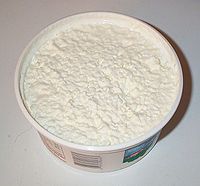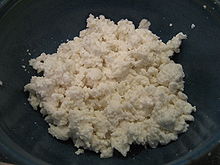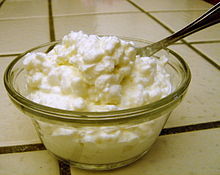- Cottage cheese
-
Cottage cheese is a cheese curd product with a mild flavor. It is drained, but not pressed, so some whey remains and the individual curds remain loose. The curd is usually washed to remove acidity, giving sweet curd cheese. It is not aged or colored. Different styles of cottage cheese are made from milks with different fat levels and in small curd or large curd preparations. Cottage cheese which is pressed becomes hoop cheese, farmer cheese, pot cheese or queso blanco.
Cottage cheese can be eaten by itself, with fruit, with fruit puree, on toast, with tomatoes, in green salads, or used as an ingredient in recipes such as lasagna, jello salad and various desserts. Cottage cheese with fruit such as pears or peaches is a standard side dish in many "home cooking" or meat-and-three restaurants' menus. Some folks even add it to chili beans.
The term "cottage cheese" is believed to have originated because the simple cheese was usually made in cottages from any milk left over after making butter. The term was first used in 1848.[1] The curds and whey of nursery rhyme fame is another dish made from curds with whey, but it is uncertain what their consistency was, if they were drained at all or how they were curdled (which affects the flavor). Some writers claim they are equivalent or similar.[2]
Contents
Curd size
The curd size is the size of the "chunks" in the cottage cheese. The two major types of cottage cheese are small curd, high-acid cheese made without rennet, and large curd, low-acid cheese made with rennet. Rennet is a natural complex of enzymes that speeds curdling and keeps the curd that forms from breaking up; adding it shortens the cheesemaking process, resulting in a lower acid and larger curd cheese, and reduces the amount of curd poured off with leftover liquid (the whey).[3] Sometimes large curd cottage cheese is called "chunk style."
Nutrition
Cottage cheese Nutritional value per 100 g (3.5 oz) Energy 412 kJ (98 kcal) Carbohydrates 3.38 g - Sugars 2.67 g - Dietary fiber 3.0 g Fat 4.30 g Protein 11.12 g Vitamin A equiv. 37 μg (5%) - beta-carotene 12 μg (0%) Calcium 83 mg (8%) Iron 0.07 mg (1%) Magnesium 8 mg (2%) Phosphorus 159 mg (23%) Potassium 104 mg (2%) Sodium 364 mg (24%) Zinc 0.40 mg (4%) Percentages are relative to US recommendations for adults.
Source: nutritiondata.comSource: USDA Nutrient DatabaseA 4 oz (113 g) serving of 4% fat product has about 120 calories, 5 g fat (3 g saturated), 3 g carbohydrates, and 14 g protein. It also contains about 500 mg sodium, 70 mg calcium and 20 mg cholesterol.
Some manufacturers also produce low-fat and nonfat varieties. A fat-free kind of a similar serving size has 80 calories, 0 g fat (0 g saturated), 6 g carbohydrates, and 14 g protein.
To compensate for the flavor missing from the fat, low-fat and nonfat ones tend to have more sugar in them. Very low sodium varieties are also produced, which can be salted to taste.
It is popular among dieters and some health food devotees. Cottage cheese is a favorite food among bodybuilders, runners, and weightlifters for its high content of casein protein (a longer lasting protein) while being relatively low in fat. Pregnant women are advised that cottage cheese is safe to eat during their pregnancy, whereas some cheese products are not.[4]
See also
References
- ^ "Definition of cottage". Online Etymology Dictionary. http://www.etymonline.com/index.php?search=cottage&searchmode=none. Retrieved 2008-10-11.
- ^ Driscoll, Michael; Meredith Hamiltion, Marie Coons (May 2003). A Child's Introduction Poetry. 151 West 19th Street New York, NY 10011: Black Dog & Leventhal Publishers. p. 10. ISBN 1-57912-282-5. http://search.barnesandnoble.com/A-Childs-Introduction-to-Poetry/Michael-Driscoll/e/9781579122829.
- ^ "Making Cottage Cheese at Home 1977" (PDF). United States Department of Agriculture Home and Garden Bulletin Number 129. http://agnic.msu.edu/hgpubs/modus/morefile/hg129_77.pdf. Retrieved 2007-07-22.
- ^ "Eating cheese during pregnancy". http://www.babycentre.co.uk/pregnancy/nutrition/foodsafety/cheeseexpert/. Retrieved 2009-10-18.
External links
Categories:- Acid-set cheeses
Wikimedia Foundation. 2010.



